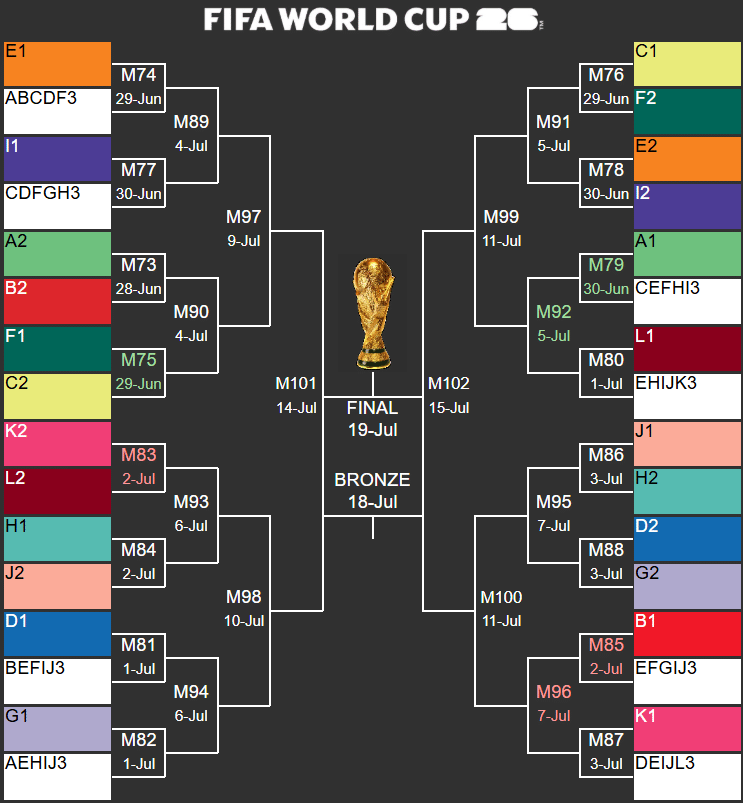
FIFA WORLD CUP 2026 knockout bracket is ready. But there are a few problem.
【2026W杯】
トーナメント表できた
でも不満タラタラ
日本語記事はこちら
The 2026 world cup match schedule is published on FIFA's website.

The group stage portion is color-coded into 12 different colors, and the matchups for round 32 and beyond have been decided.
Based on the match schedule, I created knockout bracket.

Red text (M83, M85, M96) indicates the Canada venue.
Tournament Format
The basic specifications for hosting the World Cup are summarized. This content is reflected in knockout bracket above.
The group stage will consist of 12 groups of 4 teams each.
The host countries will be placed in the following groups:
Mexico: Group A
Canada: Group B
USA: Group D
The group stage will be a round-robin format with each team playing 3 matches.
The top 2 teams from each group will advance to the knockout stage.
The top 8 third-placed teams from the group stage will also advance to the knockout stage.
The knockout stage will consist of 32 teams.
Teams from the same group will not face each other again until the quarterfinals.
The first and second-placed teams from the same group will only face each other again in the final or the third-place match.
There will be at least 3 days between matches (excluding the third-place match).
There will be 72 matches in the group stage.
There will be 32 matches in the knockout stage.
A total of 104 matches will be played.
What can be inferred from knockout bracket
It says 'what can be inferred,' but it's mostly criticism.
1. If the host country advances as the top team, they will play domestic matches until the Round of 16
Of course, Mexico would want to advance as the top team and play domestically. But isn't it harsh to impose the same on Canada? (This is just my personal opinion.) Also, even if they advance as the second team, wouldn't it be fair for them to play domestically in the Round of 32? (This is just my personal opinion.)
If it were up to me,
I would hold M73 in Mexico. (Canada would have to compromise)
I would hold M74 and M81 in Canada. (not considering the USA)
Go Canada!

2. It is difficult to determine which teams will face each other in the first-place vs. third-place match.
Although five groups are indicated as candidates for third-place advancement, how is it decided?
There are 495 patterns for 8 teams to advance out of 12 teams.
$$
\binom{12}{8} = \frac{12!}{8!(12-8)!} = 495
$$
It will probably be determined uniquely for all 495 patterns. However, it is undoubtedly difficult to understand.
3. The travel schedule for third-place advancing teams is tough
The third-place advancing teams cannot be confirmed until all group stage matches are completed. As a result, the opponent of the first-place team in Group E for Match 74 will have a tight travel schedule. It will be like having only one day in between.
In theory, once the schedule for Group F is completed, one team from Groups A, B, C, D, and F can be expected to advance. If this approach is taken, the burden of the travel schedule will be reduced. However, if teams are tied in position, the advancement cannot be confirmed, and the travel will be postponed until after the next day's match is completed. If this method is adopted, the way to determine the matchups for first-place vs. third-place teams will become even more complicated.
4. There is a sense of unfairness depending on the group you enter
Teams in Groups C, F, H, and J are at a disadvantage. This is because the first-place team faces the second-place team, and the second-place team faces the first-place team. In other groups, the first-place team faces the third-place team, and the second-place team faces the second-place team.
Groups C, F, H, and J are clearly at a disadvantage. It is predetermined that these groups are the "groups of death."
Although it is said to be fair because the group allocation is determined by a draw, there is still a lingering sense of unfairness.
Let's hope not to end up in groups C, F, H, or J during the draw.
Previously Known Issues
Item 1 is just my personal opinion, so it's not really a problem.
However, issues 2 to 4 have been known for a long time.
The same problems occur in tournaments with 24 teams, such as the EURO. But until now, they haven't been considered major issues.
Simply expanding a 24-team tournament to 48 teams might make these problems bigger.
Will the 2026 World Cup be a disappointing tournament?
The knockout stage, being a single-elimination format, will bring tension and excitement to the matches themselves.
However, the group stage is somewhat lacking.
Debuting countries might be eager to advance to the knockout stage. However, strong and regular teams will likely just get through the group stage and prepare for the knockout stage. Such a scenario is imaginable.
The condition that 32 out of 48 countries advance to the knockout stage is lenient.
If it is held as it is, it will already be a disappointing tournament.
In my opinion.
Because,
The next match venue is decided right after the group stage matches of your team are over.
The matchups for the first round of the knockout stage are simple and clear.
There is no superiority or inferiority among the groups.
I might feel this way because I have come to know about such a method.

When you tap on it,
you will find yourself lost in wander land.
Please be careful not to get lost.
(This will be a Japanese page. )
